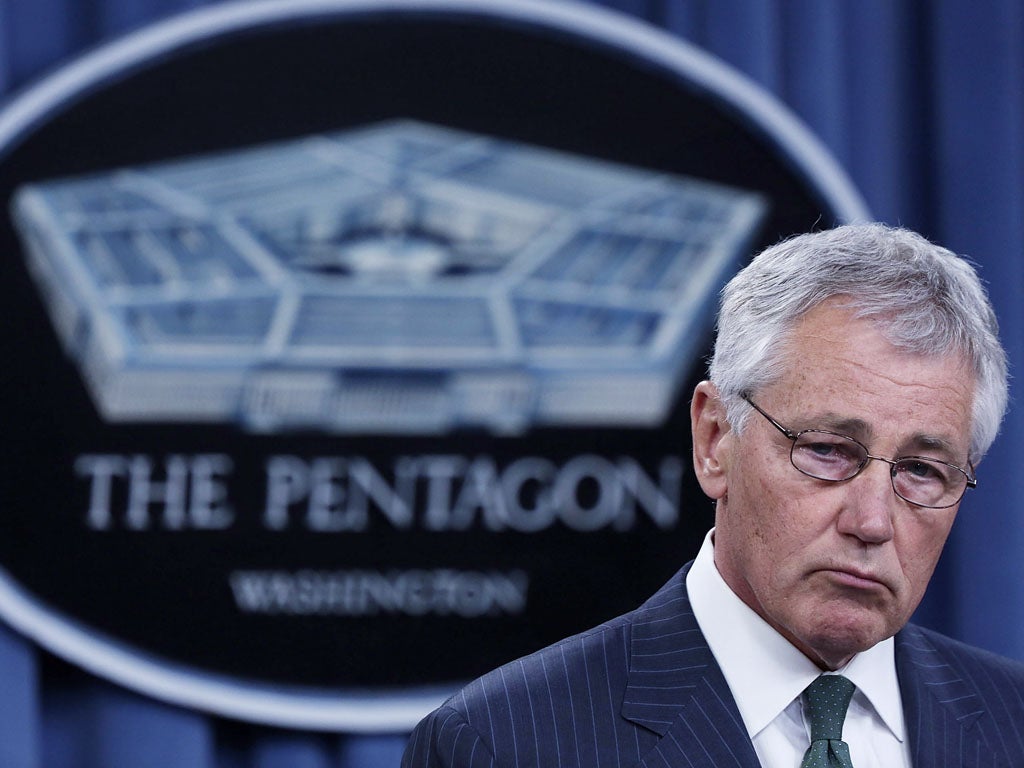Usborne in the USA: Chuck Hagel’s incompetence will be welcomed by China and Russia
Hagel is calling for a leaner, more efficient American military

American Defence Secretaries love to fly into Nato HQ and admonish everyone else to quit worrying about their domestic problems and step up their contributions to the Alliance lest it wither. Chuck Hagel did just that yesterday and one response might have been, “Give us a break”.
You can be certain that everyone at the table in Brussels had combed through the speech Mr Hagel delivered at the Pentagon on Monday calling for a leaner, more efficient American military. Rather than a reassuring and compelling vision of the future from the world’s greatest power it was a hotchpotch reaction to exactly what he wants everyone else to ignore: domestic constraints – war weariness and penury.
Alright, penury and the Pentagon in the same sentence is a bad joke. But the brass is nonetheless feeling the pinch. Until recently Mr Hagel was facing the prospect of genuinely savage shortfalls in funding under a series of automatic budget cuts known as sequestration. That fate was just avoided when Congress at last struck a budget deal for this fiscal year. But that budget and the draft of a new one for 2015-16 that President Barack Obama will unveil next week still means Hagel has to make savings, quite a lot of them.
The outlines of what he proposes are as follows. Shrink the active US Army by 13 per cent from the current 522,000 soldiers to between 440,000 and 450,000, in other words to the lowest level since before the Second World War (though nothing like as low as it was then). Eliminate the Air Force’s A-10 “Warthog” close-combat tank-buster aircraft as well as its iconic U-2 spy planes replacing the latter with drones. There would be reductions in the Army National Guard and he also wants a new round of domestic military base closings.
For these to fly in Congress, Mr Hagel will need to plumb deep into his powers of persuasion. But his well is nearly dry. It’s just over a year since the mauling that was his confirmation hearing on Capitol Hill and the scabs remain. Whatever else you thought of them, his predecessors, Robert Gates, Leon Panetta and Donald Rumsfeld, were figures of authority in Washington with degrees of intellectual credibility.
The only intellectual thread in Hagel’s presentation on Monday ran roughly like this: these cuts might look painful but imagine how much worse things would have become if sequestration had happened. It’s like a teenager admitting he’s planning to crash his father’s car but at least it won’t be a write-off.
“Secretary Hagel has failed dismally to show the US has any real plans for the future and to provide any meaningful sense of direction and real justification for defence spending,” says Andrew Cordesman of the Centre for Strategic and International Studies.
“The best that can be said of his speech… is that US strategy and forces will go hollow in a kinder and gentler manner than simply enforcing sequestration.”
A meeting between Hagel and a group of editorial writers after the speech on Monday didn’t go much better. “I know what I am doing,” he reportedly offered. “I know how to do this.” When pressed on what his “grand strategy” might be, he answered, “Defend the country”, saying nothing about America’s global role or its allies. As for what he wants his legacy to be, he quipped: “I’ll leave that to the smart guys.”
His other rationale is the winding down of the wars in Iraq and Afghanistan. America, he posited, is not about to engage in conflicts on that scale again. “We are no longer sizing the military to conduct long and large stability operations,” he said. This in the same week that Putin is stoking his military on the borders with Ukraine. Indeed, Hagel simultaneously conceded that new perils are emerging.
“We are repositioning to focus on the strategic challenges and opportunities that will define our future: new technologies, new centres of power and a world that is growing more volatile, more unpredictable and in some instances more threatening to the United States,” he said. Does this sound like muddled blather?
It does to Rich Lowry, editor of the conservative National Review. “It’s not quite true that the cuts are undertaken without any strategic thought. The Obama administration’s strategic thought is... that we need no strategic thought. It is said that the British acquired an empire through a fit of absent-mindedness. We are losing our global influence the same way. Because we can’t be bothered.”
The other Nato ministers are entitled to feel irritated but they should also feel chilled. It isn’t Hagel’s lecturing that might stir them to consider renewed modernisation of their militaries but the realisation that America is losing interest, especially in Europe and indeed the Alliance. “America’s contributions in Nato remain starkly disproportionate, so adjustments in the US defence budget cannot become an excuse for further cuts in European defence spending,” Hagel told them at a dinner meeting last night.
It’s probable that Hagel’s hatchet will be blunted on Capitol Hill and little of what he’s talking about will happen any time soon. Some, meanwhile, may think that the Pentagon could use a little humbling. Fair enough. But a stumbling Pentagon would eventually be in the interests of Russia and China, not us.

Join our commenting forum
Join thought-provoking conversations, follow other Independent readers and see their replies